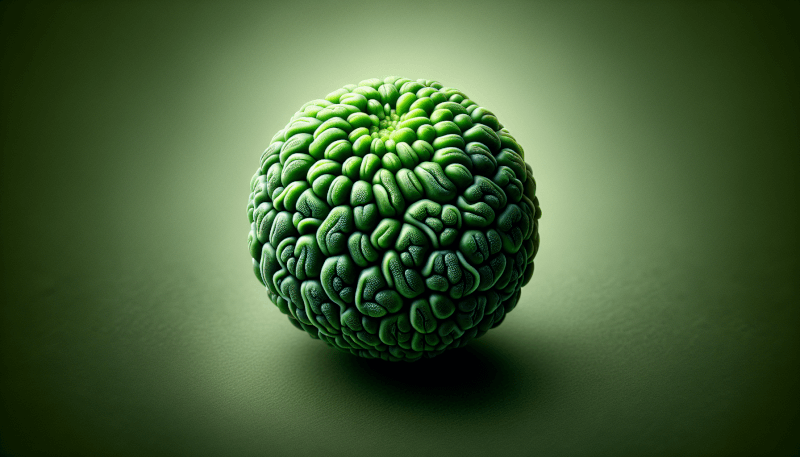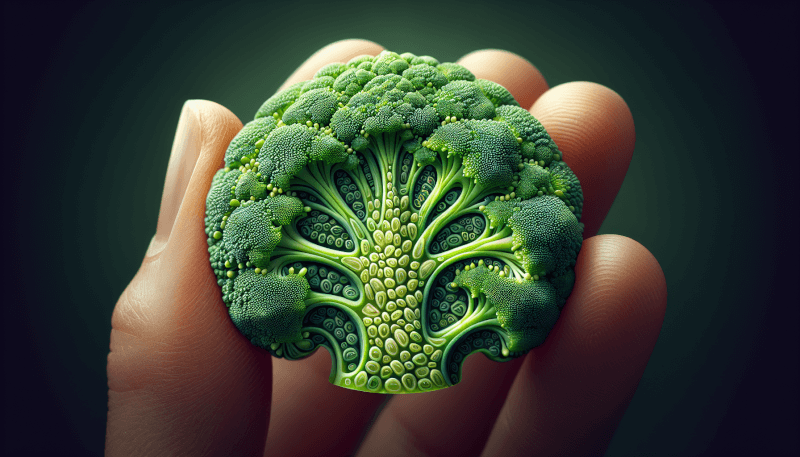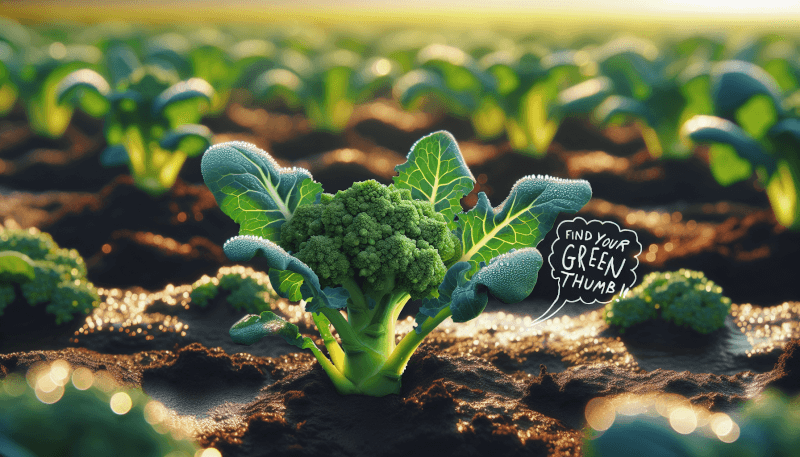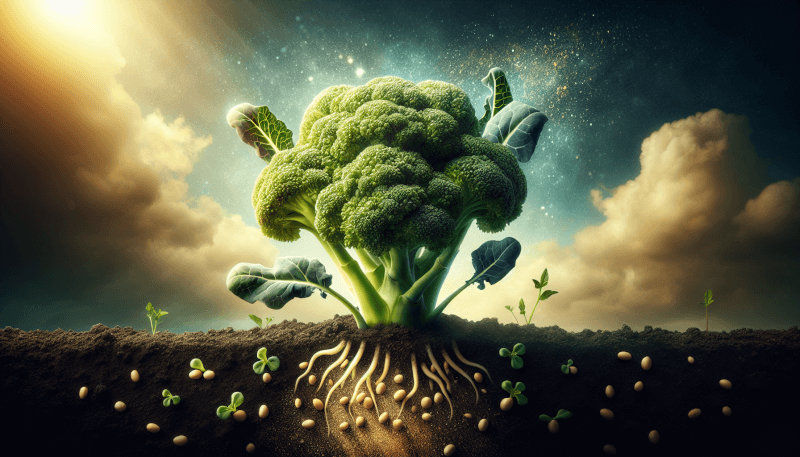👋 Click the mic button to talk to Alfred, the Todd's Seeds Gardening/Sprouting Expert – Feel free to ask him anything!
Ask Virtual Todd Anything - Click the Mic
If you’re on the lookout for high-quality broccoli seeds, look no further than the vast selection on Amazon. With an array of options to choose from, you’ll find everything you need to kickstart your gardening journey or level up your green thumb game. From heirloom varieties to organic options, the broccoli seeds on Amazon offer the opportunity to grow delicious, nutritious vegetables right in your own backyard. So, grab your gardening gloves and prepare to dig into the world of broccoli seeds on Amazon!

Benefits of Broccoli Seeds
High in nutrients
Broccoli seeds are packed with an abundance of nutrients, making them an excellent addition to any diet. They are a rich source of vitamins, including vitamin C, vitamin K, and folate. These vitamins are essential for maintaining a healthy immune system, promoting blood clotting, and supporting cell growth and development. Additionally, broccoli seeds are high in minerals like potassium, calcium, and iron, which are important for proper bodily functions and maintaining strong bones.
Potential cancer-fighting properties
Research has shown that broccoli seeds contain compounds called sulforaphane and glucosinolates, which have been found to have powerful anti-cancer properties. Sulforaphane has been shown to help prevent the growth of certain types of cancer cells and may have the ability to inhibit tumor development. Consuming broccoli seeds on a regular basis can be a natural and effective way to reduce the risk of developing various types of cancer.
Supports heart health
The nutrients found in broccoli seeds have been linked to improved heart health. The high levels of potassium in broccoli seeds can help regulate blood pressure and reduce the risk of hypertension. Additionally, the fiber content in broccoli seeds can help lower cholesterol levels and promote cardiovascular health. By incorporating broccoli seeds into your diet, you can support a healthy heart and reduce the risk of heart disease.
Boosts digestive health
Broccoli seeds are rich in dietary fiber, which is essential for maintaining a healthy digestive system. Fiber helps to regulate bowel movements, prevent constipation, and promote a healthy gut microbiome. Consuming broccoli seeds can help prevent digestive issues and keep your digestive system functioning optimally. Additionally, the fiber content in broccoli seeds can help you feel fuller for longer, supporting weight management and healthy eating habits.
Strengthens the immune system
The vitamins and minerals present in broccoli seeds can help boost the immune system and support overall health. Vitamin C, in particular, is known for its immune-boosting properties. It helps stimulate the production of white blood cells, which are essential for fighting off infections and diseases. Including broccoli seeds in your diet can provide your body with the necessary nutrients to keep your immune system strong and efficient.
How to Choose the Right Broccoli Seeds on Amazon
Organic vs. Non-organic
When choosing broccoli seeds on Amazon, you may come across both organic and non-organic options. Organic broccoli seeds are grown without the use of synthetic pesticides, herbicides, or genetically modified organisms (GMOs). They are also free from chemical fertilizers and are produced in accordance with organic farming standards. Non-organic broccoli seeds may have been grown using conventional farming methods, which may involve the use of synthetic chemicals. It is recommended to choose organic broccoli seeds if you prioritize sustainability and want to avoid potential exposure to harmful chemicals.
Variety selection
Broccoli seeds come in various varieties, each offering unique characteristics in taste, texture, and growth habits. Some popular broccoli seed varieties include ‘Calabrese,’ ‘Purple Sprouting,’ ‘Waltham,’ and ‘Romanesco.’ Consider your preferences and the specific qualities you desire in your broccoli when selecting a variety. Whether you prefer a traditional broccoli flavor or want to experiment with a new taste, exploring different varieties can enhance your culinary experience.
Customer reviews
Before making a purchase on Amazon, it is helpful to read customer reviews for the broccoli seeds you are considering. Reviews can provide valuable insights into the quality and performance of the seeds. Look for reviews that mention factors such as germination rates, yield, taste, and overall customer satisfaction. Taking the time to read reviews can help you make an informed decision and ensure you choose high-quality broccoli seeds.
Seed quality
The quality of the seeds is crucial for successful germination and growth. Look for broccoli seeds that are fresh and have a high germination rate. High-quality seeds should appear plump and firm, with no signs of damage or deterioration. It is also beneficial to choose heirloom or non-hybrid broccoli seeds, as these tend to produce plants with more desirable traits and flavors. Check the product descriptions and packaging for information on seed quality and ensure the seeds meet your standards.
Packaging
Consider the packaging of the broccoli seeds when making your selection. Seeds should be securely packaged in a way that protects them from damage during shipping and storage. Look for packets that are resealable, allowing you to store any unused seeds for future use. Additionally, packaging that provides clear and detailed planting instructions can be beneficial, especially for beginner gardeners. Ensure that the product description includes information on the packaging quality and suitability for long-term storage.

Top Broccoli Seed Brands on Amazon
Brand A
Brand A offers a wide variety of broccoli seeds, ranging from traditional varieties to unique heirloom options. They are known for their consistent seed quality and high germination rates. Customer reviews praise Brand A for the excellent flavor and texture of their broccoli. Their packaging is reliable and includes detailed planting instructions for easy cultivation. Overall, Brand A is a top choice for those seeking reliable and flavorful broccoli seeds on Amazon.
Brand B
Brand B specializes in organic broccoli seeds, perfect for those seeking a sustainable and chemical-free option. Their seeds are certified organic and non-GMO, providing peace of mind to environmentally conscious consumers. Brand B’s broccoli seeds have a high germination rate and produce robust and healthy plants. Customers appreciate their commitment to organic farming and the quality of their seeds. If you prioritize organic products, Brand B is an excellent choice for broccoli seeds on Amazon.
Brand C
Brand C is a trusted name in broccoli seed production, offering a diverse selection of varieties to suit every gardener’s needs. Their seeds have a reputation for strong germination and produce vigorous plants. Brand C’s broccoli is known for its consistent flavor and quality. Their packaging is informative and includes tips for successful cultivation. If you are looking for reliable and flavorful broccoli seeds, Brand C is worthy of consideration.
Brand D
Brand D stands out in the broccoli seed market for its focus on unique and rare varieties. They offer broccoli seeds that are not easily found elsewhere, allowing gardeners to experiment with new flavors and textures. Their seeds have good germination rates, and customers appreciate the diversity of options available. The packaging of Brand D’s seeds is sturdy and includes detailed growing instructions. If you have a sense of adventure and want to try something different, Brand D is an excellent choice for broccoli seeds.
Brand E
Brand E is renowned for its commitment to seed purity and non-GMO production. Their broccoli seeds are carefully selected to ensure optimal flavor and quality. Brand E’s seeds consistently show excellent germination rates, and their plants are known for their productivity. Customers appreciate the reliability and high standards of Brand E’s broccoli seeds. If you value purity and quality in your seeds, Brand E is a top contender for broccoli seeds on Amazon.
Step-by-Step Guide to Growing Broccoli from Seeds
Preparing the soil
Before sowing broccoli seeds, it is important to prepare the soil properly. Broccoli prefers well-drained soil enriched with organic matter. Begin by removing any weeds or debris from the planting area. Loosen the soil to a depth of around 6-8 inches, incorporating compost or aged manure to improve fertility. Ensure the soil is slightly acidic with a pH level between 6.0 and 6.8. Smooth out the soil surface, removing any large clumps or rocks.
Sowing the seeds
Broccoli seeds can be directly sown into the garden or started indoors and later transplanted. If starting indoors, sow the seeds in seed trays or starter pots filled with seed starting mix. Plant the seeds at a depth of approximately ¼ to ½ inch and cover them lightly with soil. Keep the soil consistently moist but not waterlogged. For direct sowing, create shallow furrows in the prepared soil, about ½ inch deep. Space the furrows approximately 12-18 inches apart and sow the seeds along the furrow. Cover the seeds with soil and gently tamp the soil down.
Watering and fertilizing
Broccoli plants require consistent moisture throughout their growth. Water the seeds or seedlings gently to avoid displacing them. Maintain moist soil by watering regularly, keeping the soil evenly moist but not overly saturated. Avoid overhead watering, as it can lead to fungal diseases. As the plants mature, establish a regular watering schedule, providing approximately 1 inch of water per week. Additionally, apply a balanced organic fertilizer or compost around the base of the plants every 4-6 weeks to provide necessary nutrients.
Caring for seedlings
Once the seedlings emerge, thin them out to a spacing of 18-24 inches between plants to allow for proper growth. As the plants grow, ensure they receive adequate sunlight, as broccoli requires full sun to thrive. Monitor the plants for pests and diseases and take appropriate action if necessary. Regularly remove any weeds that compete for nutrients and water with the broccoli plants. Mulching around the plants can help suppress weeds and conserve moisture.
Harvesting
The time to harvest broccoli will vary based on the variety chosen and local growing conditions. Most broccoli varieties are ready for harvest approximately 60-85 days after sowing the seeds. Harvest the central large head of the broccoli when the buds are tightly closed and the head is firm. Use a sharp knife or pruners to cut the head off the plant, leaving about 6 inches of the stem attached. After harvesting the main head, secondary smaller heads, called side shoots, may continue to develop and can be harvested when they reach an appropriate size. Enjoy the freshly harvested broccoli in a variety of delicious recipes.

Broccoli Seeds vs. Broccoli Sprouts
Differences in taste and texture
Broccoli seeds and broccoli sprouts offer distinct differences in taste and texture. Broccoli seeds have a mild and slightly bitter flavor, similar to fully grown broccoli. These seeds are typically consumed by grinding them into a fine powder or used in cooking and baking. On the other hand, broccoli sprouts have a delicate and crisp texture, with a milder taste compared to fully grown broccoli. They are often enjoyed raw in salads, sandwiches, or as a topping for various dishes.
Nutritional comparison
Both broccoli seeds and broccoli sprouts are highly nutritious, but they differ slightly in terms of their nutritional content. Broccoli seeds contain a concentrated amount of nutrients found in fully grown broccoli, providing an excellent source of vitamins, minerals, and fiber. Broccoli sprouts, on the other hand, are known to be even more nutrient-dense. They are a rich source of antioxidants, particularly sulforaphane, which is a compound found in high levels in sprouts. Sulforaphane is known for its powerful health benefits, including potential anti-cancer properties.
Growing methods
Growing broccoli seeds and broccoli sprouts require different methods. Broccoli seeds are typically sown directly in the garden or started indoors and later transplanted. They require a longer growing period and a larger space to accommodate the fully grown plants. In contrast, broccoli sprouts are grown using a process called sprouting. This involves soaking the seeds in water, rinsing them daily, and keeping them in a warm and moist environment. Within a week, the sprouts are ready to be harvested and consumed.
Uses in cooking
Broccoli seeds and broccoli sprouts can be incorporated into various dishes and recipes. Broccoli seeds are often ground into a powder and used as an ingredient in smoothies, baked goods, or added as a nutritional boost to soups and sauces. They can also be cooked and enjoyed in stir-fries or roasted alongside other vegetables. Broccoli sprouts, on the other hand, are commonly used raw as a crunchy topping for salads, sandwiches, or added to wraps and bowls. Both options offer versatility and can be enjoyed in a range of culinary creations.
Tips for Successful Broccoli Seed Germination
Seed soaking
To improve germination rates, soak broccoli seeds in water for approximately 8-12 hours before planting. This process helps soften the seed coat and encourages faster and more even germination. After soaking, drain the water and plant the seeds according to the recommended depth.
Temperature and light requirements
Broccoli seeds require specific temperature and light conditions for successful germination. Optimal soil temperature for germination is around 60-85°F (15-29°C). Provide consistent warmth by placing the seed trays or pots in a warm location or using a seedling heat mat. Once the seeds have germinated, provide them with ample sunlight or grow lights. Broccoli plants thrive in full sun and should receive at least 6-8 hours of direct sunlight per day.
Using a seed tray or starter pots
Starting broccoli seeds in a seed tray or individual starter pots can facilitate proper growth and make it easier to transplant them later. Use seed starting mix or a well-draining potting mix. Plant one to two seeds per cell or pot, ensuring the seeds are placed at the correct depth. This method allows for easier monitoring and care of the seedlings until they are ready for transplantation.
Maintaining proper moisture levels
Consistent moisture is essential for successful germination. Ensure that the soil remains consistently moist but not waterlogged. Avoid overwatering, as excessive moisture can lead to seed rot or damping-off. Use a spray bottle or a gentle watering method to prevent disturbing the seeds or seedlings. Regularly check the moisture level of the soil and adjust watering accordingly.
Transplanting seedlings
Once the seedlings have developed several true leaves and are approximately 4-6 inches tall, they are ready for transplantation into the garden or larger pots. Harden off the seedlings by gradually exposing them to outdoor conditions for a week before transplanting. When transplanting, dig a hole slightly larger than the root ball of the seedling and gently place it in the hole. Backfill the hole with soil, ensuring the seedling is planted at the same depth it was growing in the tray or pot. Water thoroughly after transplanting to help the seedling establish in its new environment.

Common Problems and Troubleshooting
Seed rot or damping-off
Seed rot or damping-off is a common problem in the early stages of seed germination. It is caused by fungal pathogens in the soil that can destroy the seeds or seedlings. To prevent seed rot, ensure that the soil is well-draining and avoid overwatering. Starting seeds in sterile seed starting mix or using a fungicidal treatment can also help reduce the risk of damping-off.
Pests and diseases
Broccoli plants can be susceptible to various pests and diseases, including aphids, cabbage loopers, and powdery mildew. Monitor the plants regularly and take prompt action if pests or diseases are detected. Natural remedies, such as neem oil or insecticidal soap, can often effectively control common pests. In case of severe infestations or diseases, consult with a local gardening expert or use appropriate organic pesticides.
Bolting
Bolting refers to the premature flowering of broccoli plants, which can significantly affect crop quality. It is often triggered by high temperatures or inconsistent watering. To prevent bolting, choose broccoli varieties that are less prone to bolting and ensure consistent moisture levels. When growing in warmer regions, consider providing shade or planting broccoli during cooler times of the year. Harvest broccoli heads promptly when they are mature to prevent bolting.
Poor or uneven germination
Poor or uneven germination can be attributed to various factors, including old or low-quality seeds, improper planting depth, or unfavorable temperature conditions. To achieve more even germination, use fresh and high-quality seeds. Ensure the seeds are planted at the recommended depth and follow proper temperature guidelines for germination. Using a seed starting mix specifically designed for optimal germination can also improve success rates.
Nutrient deficiencies
Broccoli plants can suffer from nutrient deficiencies, which can affect their growth and overall health. Common nutrient deficiencies include nitrogen, phosphorus, and potassium. To prevent deficiencies, provide balanced organic fertilizers or compost during the growing season. Regularly monitor the plants for signs of leaf discoloration or stunted growth. If nutrient deficiencies are detected, consider adjusting the fertilizer application or amending the soil accordingly.
Broccoli Seed Storage and Shelf Life
Optimal storage conditions
To maintain the viability of broccoli seeds, proper storage conditions are essential. Store broccoli seeds in a cool and dry location, away from direct sunlight and moisture. A temperature of around 40°F (4°C) is ideal for long-term storage. Keep the seeds in airtight containers or seed envelopes to protect them from moisture and pests. Placing silica gel packets or rice inside the storage containers can help absorb excess moisture and prolong seed viability.
Length of viability
Broccoli seeds have a relatively long shelf life when stored under optimal conditions. On average, broccoli seeds can remain viable for up to 3-5 years. However, it is important to note that seed viability gradually decreases over time, and germination rates may decrease after a few years. To ensure the highest germination rates, it is recommended to use fresh seeds or those that are less than two years old.
Seed saving and preserving
Saving and preserving broccoli seeds from a previous harvest can be a cost-effective and sustainable approach. To save seeds, allow a broccoli plant to bolt and produce flowers. Once the flowers have dried, carefully collect the seed pods or heads and let them further dry in a well-ventilated area. Once completely dry, remove the seeds from the pods. Store the collected seeds in airtight containers or envelopes, ensuring they are labeled and dated. Properly stored, saved broccoli seeds can remain viable for several years.
Broccoli Seeds for Microgreen Production
Benefits of broccoli microgreens
Broccoli microgreens are young, tender plants that are harvested at the seedling stage. They offer a concentrated dose of nutrients, including vitamins A, C, and K, as well as minerals like potassium and calcium. Broccoli microgreens also contain high levels of antioxidants, which can help protect against oxidative stress and support overall health. Incorporating these tiny powerhouses into your diet can be an excellent way to boost nutrient intake and enjoy their unique flavor.
Growing microgreens vs. regular broccoli
Growing broccoli microgreens differs from growing regular broccoli in terms of time, space, and yield. Microgreens have a significantly shorter growing period, usually taking only 1-3 weeks from seed to harvest. They can be grown indoors, without the need for large garden beds or outdoor space. Regular broccoli, on the other hand, requires a longer growing season and more space to accommodate the fully mature plants. Additionally, microgreens offer a quick and continuous harvest, allowing for a steady supply of fresh greens.
Best broccoli seed varieties for microgreens
Certain broccoli varieties are particularly well-suited for microgreen production. Look for varieties labeled specifically for microgreens or those known for their tender and flavorful leaves. Some popular broccoli seed varieties for microgreens include ‘Waltham 29,’ ‘Calabrese,’ and ‘Purple Sprouting.’ These varieties tend to produce attractive and delicious microgreens that are highly sought after by home gardeners and chefs alike.
Harvesting and using microgreens
Broccoli microgreens are typically ready for harvest in 7-14 days, depending on growing conditions. Once the leaves have developed their true form and reached a suitable height of around 2-3 inches, they can be harvested. To harvest, use clean scissors or a sharp knife to cut the microgreens just above the soil surface. Rinse the harvested microgreens gently and use them immediately in salads, sandwiches, or as a nutritious garnish for a variety of dishes. Microgreens are best enjoyed fresh, as their delicate texture and flavor begin to diminish soon after harvest.
Frequently Asked Questions (FAQs) about Broccoli Seeds on Amazon
How long does it take for broccoli seeds to germinate?
On average, broccoli seeds take around 5-10 days to germinate, depending on various factors such as temperature and moisture. However, germination times can vary, and some seeds may germinate sooner or later than the average timeframe. Providing optimal growing conditions, including proper temperature and moisture, can help promote faster and more even germination.
Can I grow broccoli in containers?
Yes, it is possible to grow broccoli in containers, making it a suitable option for those with limited outdoor space. Choose a container with a minimum depth of 12 inches to accommodate the root system of the broccoli plants. Ensure the container has sufficient drainage holes to prevent waterlogged soil. Use a well-draining potting mix and follow the same planting and care guidelines as for in-ground broccoli. Containers should be placed in an area that receives at least 6-8 hours of direct sunlight per day.
Is it necessary to start broccoli seeds indoors?
Starting broccoli seeds indoors is not necessary, but it can provide several advantages. Growing broccoli from seed indoors allows for an earlier start to the growing season and gives seedlings a head start before being transplanted into the garden. Starting indoors also provides more control over growing conditions and helps protect young seedlings from pests and adverse weather. However, if you prefer direct sowing, broccoli seeds can be planted directly in the garden once the soil has warmed up and all risk of frost has passed.
Are broccoli seeds genetically modified?
Most commercially available broccoli seeds are not genetically modified. However, it is always important to read the product description or label to ensure you are purchasing non-GMO seeds. If you are concerned about genetically modified organisms, look for organic or heirloom seed options, as these are typically non-GMO and offer genetic purity.
Can I save and reuse broccoli seeds from a previous harvest?
Yes, broccoli seeds can be saved and reused from a previous harvest. When collecting seeds, choose mature and healthy seed heads or pods. Allow the seeds to fully dry in a well-ventilated area, then remove them from the pods or heads. Store the seeds in airtight containers or envelopes in a cool and dry location. Properly stored broccoli seeds can be viable for several years, allowing you to grow your own supply of delicious broccoli in future growing seasons.